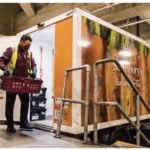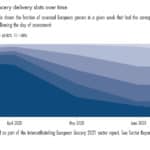Liz Morrell assesses how the pandemic has driven supermarkets to find new ways of delivering more groceries, to more customers, more efficiently
The Covid-19 pandemic has changed online grocery shopping forever. Retailers have had to adapt quickly – from the Co-op, which had only just begun online trials, to Aldi which hadn’t even got to trial stage. Grocery giants which had already invested in online shopping had to further bolster capacity in order to accommodate the enormous surge in demand. At the same time, customer behaviour changed too. Although all kinds of customer rushed to buy online, it was the elderly and the vulnerable for whom ecommerce grocery delivery proved most critical, meaning that retailers had to consider their specific needs.
ROCKETING DEMAND
Sales surged for grocery retailers, pre- and post-lockdown. In March 2020, ONS figures showed food stores’ retail sales growing by 10.4%, compared to the previous month, as significant home stockpiling began.
By the autumn, it was evident just how big a shift had taken place, with October’s ONS figures showing that shoppers had spent nearly twice as much on online groceries (+99.2%) than they had the previous year, with around one in ten (10.4%) grocery sales taking place online during the month. The figure was double the 5.4% of grocery sales taking place online in February before the pandemic hit the UK.
Yet the growth continued. By December, food stores had recorded a record year on year rise of 126.4% in online food store sales. The ONS suggested that retailer feedback had shown a permanent change in consumer habits caused by the pandemic, with online sales now accounting for 11% of all grocery retail.
This change has fed through to company results too. In January, Sainsbury’s revealed that sales for its online groceries business were up by 128% in the Christmas quarter of its financial year, with 18% of grocery sales taking place online. Tesco also saw a record Christmas, delivering more than seven million orders and over 400m individual items. Online sales grew more than 80%, accounting for nearly £1bn in extra sales over the 19-week period.
CHANGING MODELS FOR THE GROCERY GIANTS
The supermarket giants have boosted staff numbers and capacity. Sainsbury’s has more than doubled the number of slots for home delivery and click and collect and is on track to offer around 800,000 online delivery slots a week. Asda offers 850,000 slots currently, with 900,000 planned by April.
Tesco has also doubled its online capacity since the start of the outbreak and now offers around 1.5m slots every week, including both home delivery and click and collect. The retailer continues to ringfence priority slots for vulnerable customers, with more than 800,000 such customers now on its list.
Iceland had also seen a 300% increase in home deliveries year on year by September 2020, boosting capacity to handle up to 750,000 orders a week. It offers priority delivery to 300,000 shielding or vulnerable customers.
CLICK AND COLLECT
Click and collect has boomed and, as with home delivery, has been adopted by retailers new to online sales. Aldi initially trialled click and collect in one store in September 2020 before expanding to more than 200 stores by Christmas. Morrisons has expanded from 14 stores offering click and collect last March to nearly 450 as of January 2021. Sainsbury’s has added 200 new locations to its network, with click and collect accounting for 24% of online sales in the Christmas week in December.
ADAPTING TO DELIVERY
Some of the most impressive changes have come from those for whom online delivery was previously more of a future project. Co-op, for example, launched ecommerce delivery in March 2019 but by early 2020, was still only delivering direct from 50 stores. At the start of 2021, it now delivers from more than 1,000 stores and is the most widely available supermarket on Deliveroo. This online expansion comes after the company was forced to condense a five-year rollout plan into just a few months. It has seen a tenfold increase in the volume of orders, with many customers new to the Co-op. Chris Conway, head of ecommerce at the Co-op, says the retailer has seen new customers as a result. “We have attracted new customers and demographics, including customers who had not used online channels before and are seeing stickability to the channel too”.
Aldi, too, moved online, initially with essential product food parcels to help vulnerable and self-isolating customers. It launched an on-demand delivery trial with Deliveroo, which expanded to nearly 130 stores in November. This allows customers within a 6km radius of a participating store to use the bike delivery app and choose from around 400 Aldi grocery items.
Richard Thornton, communications director at Aldi UK, says the move has helped those unable to visit its shops, while also attracting new customers. “By expanding our online presence,
we’ve made Aldi accessible to thousands of shoppers who might never have visited before, or who aren’t able to visit a store in person at the moment,” he said.
Morrisons, too, worked with Deliveroo in April, as well as offering same-day deliveries through Amazon, in addition to its existing delivery service supported by Ocado.
THE RISE OF THE TAKE-AWAY FOOD DELIVERY APPS
This trend for same-day delivery has seen an explosion in the use of food delivery apps, such as Deliveroo, Buymie, Zoom and Uber Eats – all of whom have announced various grocery retailer partnerships since the pandemic began.
Deliveroo is one of the biggest winners of the year, having announced several grocery partnerships including Sainsbury’s, Waitrose, Aldi and Morrisons. “Grocery delivery is a driver of growth and we are focused on expanding our partnerships and building the best proposition for all three sides of our marketplace,” said a spokesperson for Deliveroo.
UberEats is working with Iceland and Sainsbury’s in London and will provide a 30-minute delivery service from 200 stores on 350 Asda products from February.
Other players are also growing quickly. Dublin startup Buymie delivers for the likes of Dunnes, Tesco and Lidl in Ireland and partnered with the Co-op to deliver in Bristol last May.
The Co-op is working with Pinga in East London and has expanded its use of autonomous deliveries. The company was the first UK retailer to use autonomous robot delivery through a partnership which began in 2018 with Starship Technologies. The retailer now delivers in Northampton and Milton Keynes and hopes to be using up to 300 of the robots by the end of 2021.
It seems the appetite for online grocery shopping shows no sign of waning any time soon.

